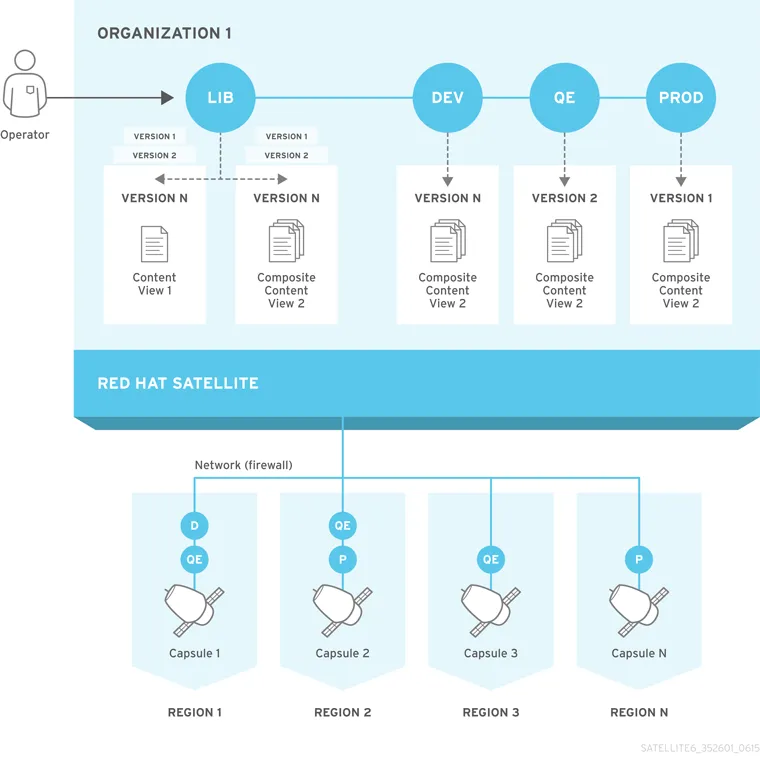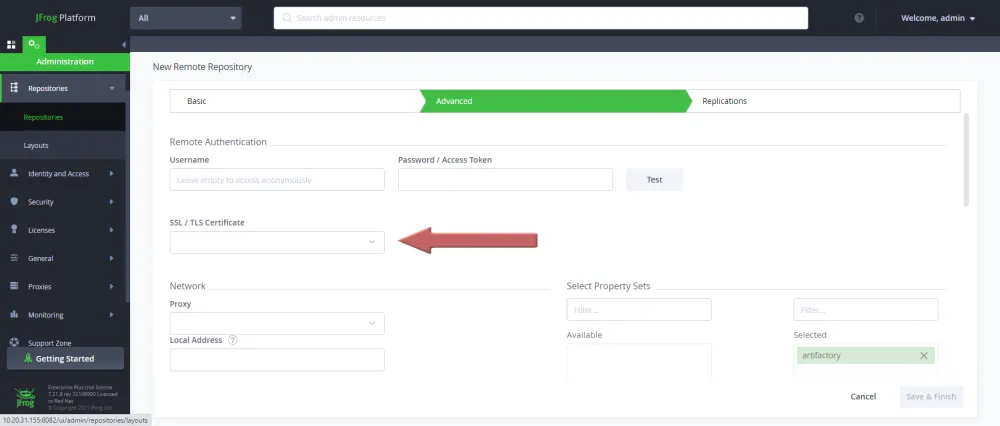Red Hat Satellite is a systems management solution that can help an organization deploy, configure and maintain systems across multi-cloud environments and on-premises environments. Satellite provisions, monitors and remotely manages Red Hat Enterprise Linux deployments in a single centralized tool.
JFrog Artifactory is a universal repository manager for binary life cycle management of artifacts, providing end-to-end management of artifacts throughout the software lifecycle process.
The purpose of this post is to show how Artifactory’s repository management helps organize and distribute Satellite’s life cycle management capabilities to downstream layers to keep Enterprise Linux systems running with consistent packages across the enterprise.
In Satellite, one could define a library of content from external sources for an Organization. Content views can be created as subsets of content from the Library. One can publish and promote content views into lifecycle environments - typically dev, QA and Production.
 In Artifactory, we need to define remote repositories mapping to each lifecycle environment. For example: Define an Artifactory remote repository called “dev-rpm-remote-dc” which corresponds to the dev lifecycle environment.
In Artifactory, we need to define remote repositories mapping to each lifecycle environment. For example: Define an Artifactory remote repository called “dev-rpm-remote-dc” which corresponds to the dev lifecycle environment.
Steps to combine Red Hat Satellite and JFrog Artifactory
Let's walk through the steps you need to follow to set this up. The post assumes you already have an up-to-date version of Red Hat Satellite and JFrog Artifactory. (The post is based around JFrog’s Artifactory version 7.21.)
Create an Organization Debug Certificate
To create a debug certificate for an organization, complete the following steps:
1. In the Satellite web UI, navigate to Administer > Organizations

2. Select an organization that you want to generate a debug certificate for
3. Click Generate and Download

4. Save the certificate file in a secure location
Gather the Satellite URL for the lifecycle environment you wish to add:
Procedure
Log into a system that is registered to the Satellite server and connected to the Lifecycle Environment you wish to add to Artifactory, and either manually assemble the URL or use the script below to retrieve the URLs.
Manual method:
1. Start with the URLs listed in /etc/yum.repos.d/redhat.repos
2. Replace $releasever with the value of: rpm -q --provides rpm -qf /etc/redhat-release | grep releasever
3. Replace $basearch with the value of: uname -i
Script:
You can run this script to automatically generate URLs for your lifecycle environment:
curl -s https://raw.githubusercontent.com/cshabazian/Get-Satellite-URLs/main/Get_Satellite_URLs.sh | bash
Add the Satellite Certificate to Artifactory:
Procedure
1. In the Artifactory web UI, navigate to SERVICES > Artifactory and select Certificates

2. Click + New Certificate

3. Give this certificate a recognizable alias such as Organization Satellite Certificate and drag and drop the certificate generated above into the Certificate box and click Save

Restart Artifactory server process for certificates to be trusted:
Procedure
1. Login to the Artifactory server and run as root:
systemctl restart artifactory
Add the repository to Artifactory:
Procedure
1. In the Artifactory web UI, navigate to Repositories > Repositories, click + Add Repositories, and select Remote Repository

2. In the Package Type dialog that pops up, select RPM

3. Select Advanced options and in SSL / TLS Certificate, select the certificate you loaded in the previous steps

4. Select Basic options, and in the URL box, paste the URL you previously gathered and click Test to ensure everything is setup correctly, Then click Save & Finish

Conclusion
In this post we’ve demonstrated how to define repositories in Artifactory as a backend to Satellite package distributions. We hope you’ll be able to take these basic steps and leverage them to do your own integrations between JFrog’s Artifactory version 7.21 and Red Hat Satellite version 6.x.
If you have questions about our proposed integration, or if you’re just getting started on your Red Hat and JFrog journey, find out more at JFrog.com or try Artifactory out for yourself on OpenShift.
Special thanks to Chip Shabazian, Red Hat Senior Platform Technical Account Manager, who made a major contribution to the writing of and technical review of this post, and the work to bring these products together to solve customer problems.
About the author
Sudhindra Rao is seasoned technologist helping customers enabling them to transform how they build, deploy and run software. He has worked on a complete spectrum of technologies from mainframe to middleware to cloud and now DevOps. Rao is a leading Indian classical musician teaching Indian Percussion drum called Mridangam and lives in Raleigh, NC.
More like this
Red Hat Enterprise Linux now available on the AWS European Sovereign Cloud
Revolutionizing learning: How Ford's Kubernetes community sparks technological innovation
You Can't Automate Buy-In | Code Comments
You Can’t Automate Expectations | Code Comments
Browse by channel
Automation
The latest on IT automation for tech, teams, and environments
Artificial intelligence
Updates on the platforms that free customers to run AI workloads anywhere
Open hybrid cloud
Explore how we build a more flexible future with hybrid cloud
Security
The latest on how we reduce risks across environments and technologies
Edge computing
Updates on the platforms that simplify operations at the edge
Infrastructure
The latest on the world’s leading enterprise Linux platform
Applications
Inside our solutions to the toughest application challenges
Virtualization
The future of enterprise virtualization for your workloads on-premise or across clouds
